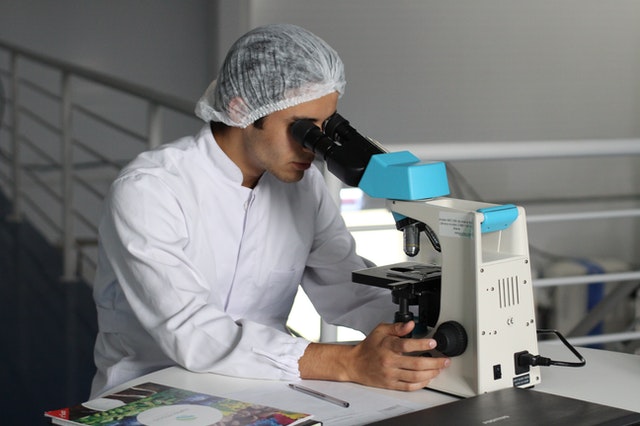The role of a pharmacy technician is critical to the smooth operation of a pharmacy. Pharmacy technicians help pharmacists dispense prescriptions to patients and healthcare professionals.
For people who want to work in healthcare but don’t want to be involved in direct patient care or in a bedside job, being a pharmacy technician is an excellent choice. It’s a rapidly growing and gratifying sector in which you may assist people in receiving the medications they require to be healthy. However, maybe you are considering the pharmacy technician salary.
Because before committing to any professional healthcare position, it’s always a good idea to educate yourself on how much you may earn and the factors that influence your earning potential.
This post is for you if you’re considering a fulfilling career as a pharmacy technician and want to learn more about the pharmacy technician salary you can expect.
How much does a pharmacy technician make?

If you’re thinking about becoming a pharmacy technician, you’ll want to know how much money you may make in a year.
According to the Bureau of Labor Statistics (BLS), pharmacy technicians earn an average hourly rate of $16.32 and annual pay of $33,950.
Due to a variety of contributing factors, determining how much money pharmacy technicians take home is not an easy undertaking. We’ll try our best to break them down for you right here.
Entry level and New graduates
According to the Bureau of Labor Statistics, pharmacy technicians in the United States earn an average hourly wage of $16.32. This amounts to a $33,950 median yearly wage.
The poorest 10% of earnings in this industry, many of whom are entry-level and newly graduated employees, earn an average of $24,120 per year or $11.60 per hour, according to the BLS.
Pharmacy tech career veterans
If you work your way up the job ladder, you may more than double your starting pay. According to the BLS, the top 10% of earnings in this industry earn $49,130 per year or $23.62 per hour.
The Federal Executive Branch ($21.60 per hour), outpatient care clinics ($21.47), and colleges, universities, and professional schools ($20.95) all have the highest pharmacy technician pay rates.
What is the average pharmacy technician salary by state?
| State | Annual Salary | Monthly Pay | Weekly Pay | Hourly Wage |
| New York | $35,786 | $2,982 | $688 | $17.20 |
| New Hampshire | $34,690 | $2,891 | $667 | $16.68 |
| Vermont | $32,792 | $2,733 | $631 | $15.77 |
| Wyoming | $31,951 | $2,663 | $614 | $15.36 |
| Maine | $31,889 | $2,657 | $613 | $15.33 |
| Massachusetts | $31,842 | $2,653 | $612 | $15.31 |
| West Virginia | $31,096 | $2,591 | $598 | $14.95 |
| Hawaii | $30,983 | $2,582 | $596 | $14.90 |
| Washington | $30,952 | $2,579 | $595 | $14.88 |
| Pennsylvania | $30,569 | $2,547 | $588 | $14.70 |
| Connecticut | $30,281 | $2,523 | $582 | $14.56 |
| Montana | $30,213 | $2,518 | $581 | $14.53 |
| New Jersey | $29,969 | $2,497 | $576 | $14.41 |
| Arizona | $29,902 | $2,492 | $575 | $14.38 |
| Rhode Island | $29,730 | $2,478 | $572 | $14.29 |
| Indiana | $29,710 | $2,476 | $571 | $14.28 |
| Alaska | $29,467 | $2,456 | $567 | $14.17 |
| North Dakota | $29,292 | $2,441 | $563 | $14.08 |
| Nevada | $29,236 | $2,436 | $562 | $14.06 |
| Maryland | $29,206 | $2,434 | $562 | $14.04 |
| Tennessee | $28,964 | $2,414 | $557 | $13.92 |
| Minnesota | $28,951 | $2,413 | $557 | $13.92 |
| Wisconsin | $28,930 | $2,411 | $556 | $13.91 |
| Georgia | $28,845 | $2,404 | $555 | $13.87 |
| Ohio | $28,753 | $2,396 | $553 | $13.82 |
| Nebraska | $28,732 | $2,394 | $553 | $13.81 |
| South Dakota | $28,436 | $2,370 | $547 | $13.67 |
| Virginia | $28,355 | $2,363 | $545 | $13.63 |
| Utah | $28,318 | $2,360 | $545 | $13.61 |
| Alabama | $28,171 | $2,348 | $542 | $13.54 |
| California | $28,108 | $2,342 | $541 | $13.51 |
| Louisiana | $28,076 | $2,340 | $540 | $13.50 |
| Oregon | $28,017 | $2,335 | $539 | $13.47 |
| Kansas | $27,628 | $2,302 | $531 | $13.28 |
| Iowa | $27,556 | $2,296 | $530 | $13.25 |
| New Mexico | $27,497 | $2,291 | $529 | $13.22 |
| South Carolina | $27,453 | $2,288 | $528 | $13.20 |
| Colorado | $27,367 | $2,281 | $526 | $13.16 |
| Delaware | $27,298 | $2,275 | $525 | $13.12 |
| Florida | $27,187 | $2,266 | $523 | $13.07 |
| Missouri | $27,165 | $2,264 | $522 | $13.06 |
| Oklahoma | $26,704 | $2,225 | $514 | $12.84 |
| Idaho | $26,305 | $2,192 | $506 | $12.65 |
| Kentucky | $26,197 | $2,183 | $504 | $12.59 |
| Mississippi | $25,885 | $2,157 | $498 | $12.44 |
| Arkansas | $25,710 | $2,143 | $494 | $12.36 |
| Michigan | $25,680 | $2,140 | $494 | $12.35 |
| Illinois | $25,571 | $2,131 | $492 | $12.29 |
| Texas | $25,383 | $2,115 | $488 | $12.20 |
| North Carolina | $23,395 | $1,950 | $450 | $11.25 |
In the United States, the Top 50 Highest Paying States for Pharmacy Technician Jobs
New York is at the top of the list, followed by New Hampshire and Vermont in second and third place, respectively. Vermont outperforms the national average by 3.3 percent, while New York continues the trend with a $4,038 (12.7 percent) increase above the national average of $31,748. Significantly, the employment market for Pharmacy Technicians in New York is highly active, with numerous organizations now hiring for this position. With just a few states paying more than the national average, moving to a new place as a Pharmacy Technician should be approached with caution. Cost of living costs should also be taken into account.
FAQs
Do pharmacy techs make good money?
Pharmacy technicians are often detail-oriented and friendly people. They usually have flexible schedules and may participate in a variety of professional groups, but do they earn well?
In the United States, pharmacy technicians make an average of $30,913 per year. Employers may be willing to pay more for further education, experience, or national certification, and your potential wages may vary depending on where you live, as well as the type of job you do. Certified pharmacy technicians earn $42,842 per year on average.
How long does it take to become a pharmacy technician?
Depending on your training or educational program, being a pharmacy technician might take up to two years. There are three basic paths to becoming a pharmacy technician:
- Diploma programs take the shortest amount of time to complete—usually a year or less. A pharmacy technician diploma program is usually more skill-focused and time-intensive, but it will prepare you to take the national pharmacy technician test. After completing a diploma degree, many pharmacy technicians choose to continue their education.
- Certification programs, such as those offered by the American Society of Health-System Pharmacists (ASHP) and the Accreditation Council for Pharmacy Education (ACPE), are another option for starting a career as a pharmacy technician. To assist students to get job experience, several certification programs incorporate exam preparation, internships, and even externships.
- Associate degree programs normally take two years to complete and build on the curriculum from certification programs with more advanced pharmacy, technical, and scientific concepts. Associate of Science, Associate of Applied Science, and Associate of Occupational Science are some of the degrees available.
Is pharmacy tech a hard job?
A pharmacy technician’s job requires quite a bit of repetition. You spend a significant part of your day obtaining prescriptions from physicians and clients, putting them into a computer, counting pills, and collecting money for medications. Physical effort is also a requirement of the job. You’re on your feet for the bulk of the day, going between the computer, medicine inventory, and the front counter. This activity must be completed swiftly and with few interruptions in busy pharmacies. Shifts for pharmacy technicians can be long and inconsistent. According to the BLS, 51% of pharmacy technicians work in retail pharmacies and drug shops that are open late and on weekends.
Besides, in the current complicated situation of the COVID-19 pandemic, the pharmacy profession is one of the professions with high development opportunities. However, to become a pharmacist, besides having to meet the requirements of the industry, of course having a PTCB certificate, your performance in the interview will also make it easier for you to get the job you want. Let’s take a look at the Common Pharmacy Technician Interview Questions in our post.
What is the highest-paying pharmacy technician job?
Although an associate degree is not often necessary for entry-level pharmacy technician positions, it might be beneficial in the long run.
Associate’s degree in pharmacy technicians:
- Are you eligible to fill prescriptions?
- Have a thorough understanding of medical legislation as it pertains to the filling of prescriptions.
- Can demonstrate a basic understanding of medical terminology
As a result, an associate degree qualifies people for higher-paying jobs like:
- Compounding lab technician
- Pharmacy service technician
- Pharmacy implementation specialist
Now that you know pharmacy technician’s salary, you might ask yourself, “How much does a pharmacy technician make?” Consider if you want to begin your pharmacy technician profession right now.
As a pharmacy technician, you’ll have the opportunity to make a significant impact in people’s lives and have regular contact with them.
As you gain experience, there are several options for you to further your career. With the increased need for pharmacy technicians, there’s never been a better time to get started in this field.
For more information about PTCB, visit our website and try free PTCE practice test, or download it for your IOS or Android devices now!
[Sassy_Social_Share]
Pharmacy Sig Codes: All Medical and pharmacy abbreviations You Should Know
It is critical to understand and retain pharmacy sig codes. We've included a master list of these abbreviations in this blog.
January 1, 2022

List Of Drug Suffixes And Meaning
In this article, we give you the way to remember the top 200 drugs easier with drug suffixes and meaning. Let’s get started!
January 1, 2022

Top 200 Drugs Every Pharmacist Should Remember [2024 Updated]
Let's look at the top 200 drugs list, each of which includes a list of all active chemicals as well as the drug class to which each ingredient belongs.
January 1, 2022

